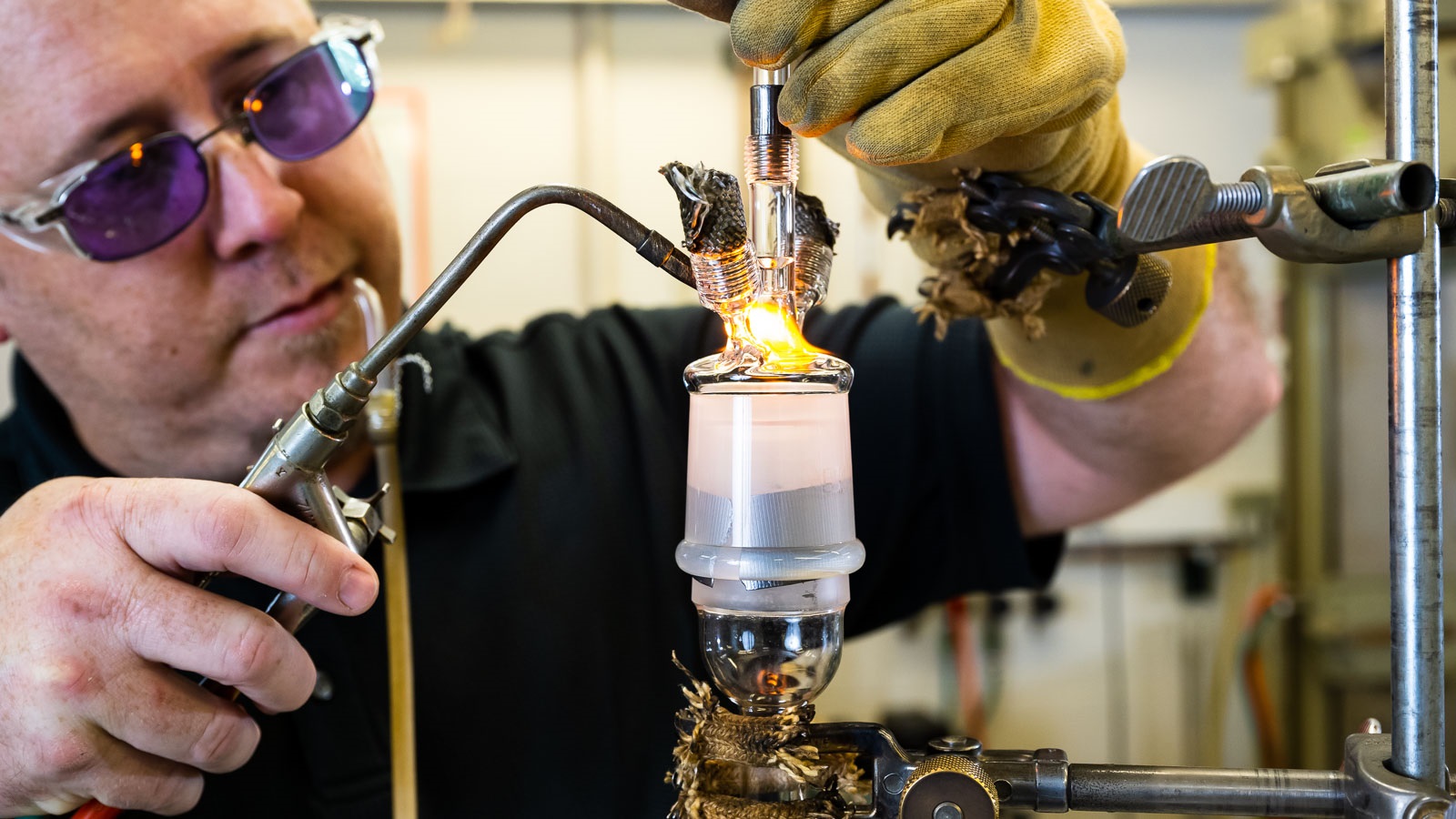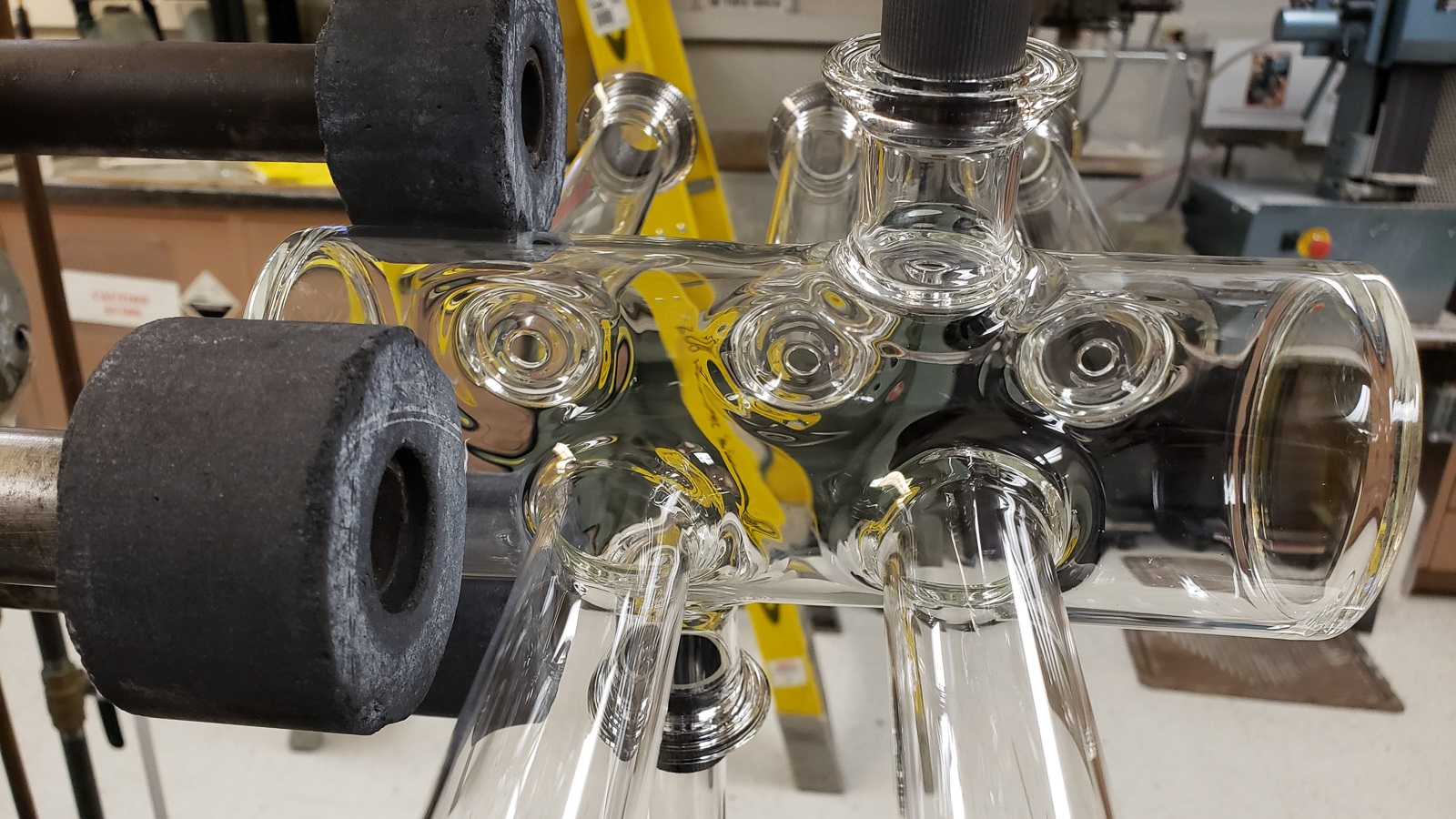
Kevin Moeller is the scientific glassblower specialist in the Chemical Sciences and Engineering division at Argonne. As a third-generation glassblower, Moeller’s interest in glassblowing started in his dad’s glass shop. “I’ve always been intrigued by glassblowing since I was a little kid, since I was able to go down to my dad’s shop and sweep up and watch other glassblowers work,” Moeller said.
Though he had other interests when starting college, Moeller ultimately decided that glassblowing was what he wanted to pursue. “Glass has made a huge impact throughout history in research, chemistry, physics, anything, and without it, we wouldn’t be nearly close to where we are right now.”
“I’ve always been intrigued by glassblowing since I was a little kid, since I was able to go down to my dad’s shop and sweep up and watch other glassblowers work.” — Kevin Moeller
After running the family business for several years, he jumped at the opportunity to work as a professional glassblower in Argonne’s Glassblowing Studio in 2015. The studio provides scientists with an opportunity to work with Moeller to design custom-made glassware in support of their research. Moeller explained, “I’ll meet with them to discuss the limitations of glass in a sense, or the numerous ways that glass can be used for their projects.”
The studio also serves as a place for scientists to stop in at any time with questions about glass — and sometimes, the questions are quite complex. “One of the great challenges of working at Argonne is every time someone comes in with a project it’s something different — something new,” he said. “Sometimes it’s something you’ve never done before — whether it’s a technique in glass or an experiment that they’re doing.”
One challenging project Moeller worked on was when he made a jacketed electrolytic cell for a customer. The project was difficult because it was made of two sealed pieces of glass, one inside the other. Three ports went through both layers of glass to enter the inner piece.
The project required several research attempts so that the customer and Moeller could decide whether the design would function how the customer needed. “Once that was decided, I was able to make the piece. Due to the jacketing and the through ports, it was a multistep process that took several hours to complete,” Moeller explained.
Another challenging project was a piece of tubing with seven ports coming off the body. The challenge was that five of the ports had small holes in the bottom that were all sealed to the body. The holes could not protrude into the main body of the vessel because this would disrupt the gas flowing into the body. As a result, Moeller had to make these holes on the same plane as the body of the vessel.
The diversity of the projects Moeller works on is what makes his position at Argonne so important. Without custom glassware, many of the experiments that researchers work on would not be possible. “Glassblowers are kind of ‘the people behind the curtain,’ and sometimes, we like to be in front of it,” Moeller said with a laugh. “Without glass, science wouldn’t be where it is, that’s for sure.”
Outside of glassblowing Moeller enjoys fishing, watching sports, working on the house and spending time with his family.
“My youngest son, is still at home, so just about anything that he’s involved in, I’m involved in,” Moeller commented.
Argonne National Laboratory seeks solutions to pressing national problems in science and technology. The nation’s first national laboratory, Argonne conducts leading-edge basic and applied scientific research in virtually every scientific discipline. Argonne researchers work closely with researchers from hundreds of companies, universities, and federal, state and municipal agencies to help them solve their specific problems, advance America’s scientific leadership and prepare the nation for a better future. With employees from more than 60 nations, Argonne is managed by UChicago Argonne, LLC for the U.S. Department of Energy’s Office of Science.
The U.S. Department of Energy’s Office of Science is the single largest supporter of basic research in the physical sciences in the United States and is working to address some of the most pressing challenges of our time. For more information, visit https://energy.gov/science.

